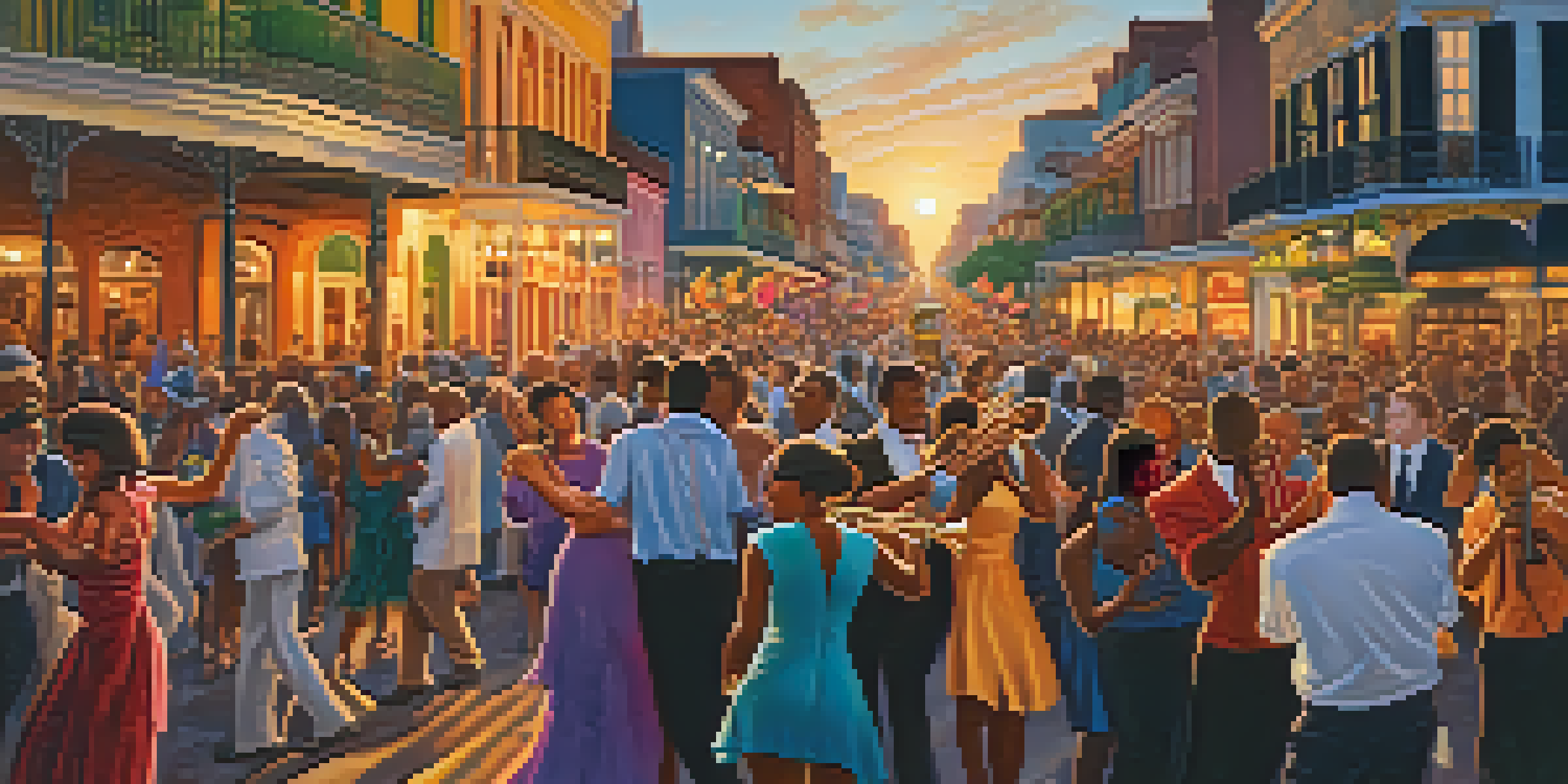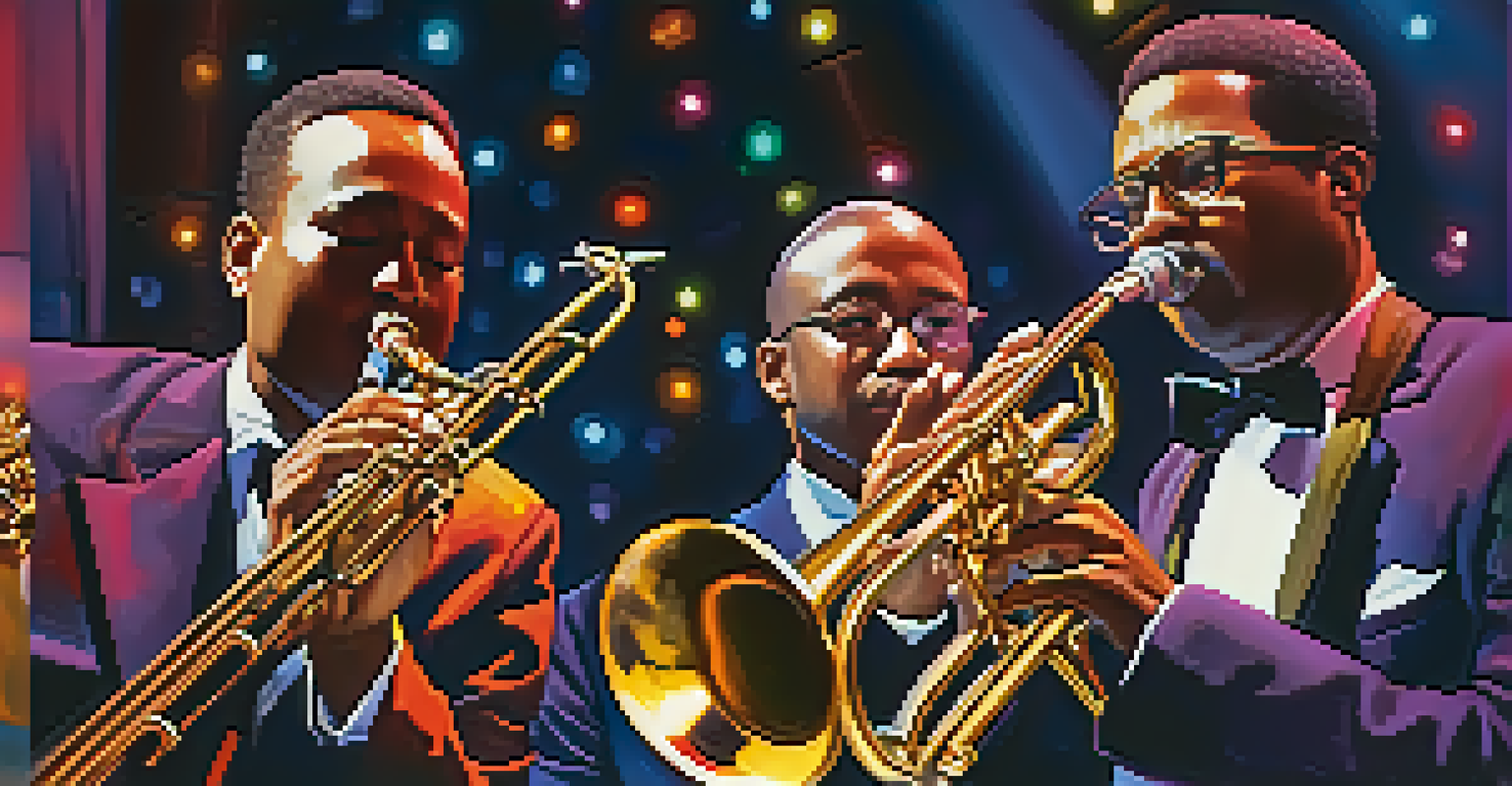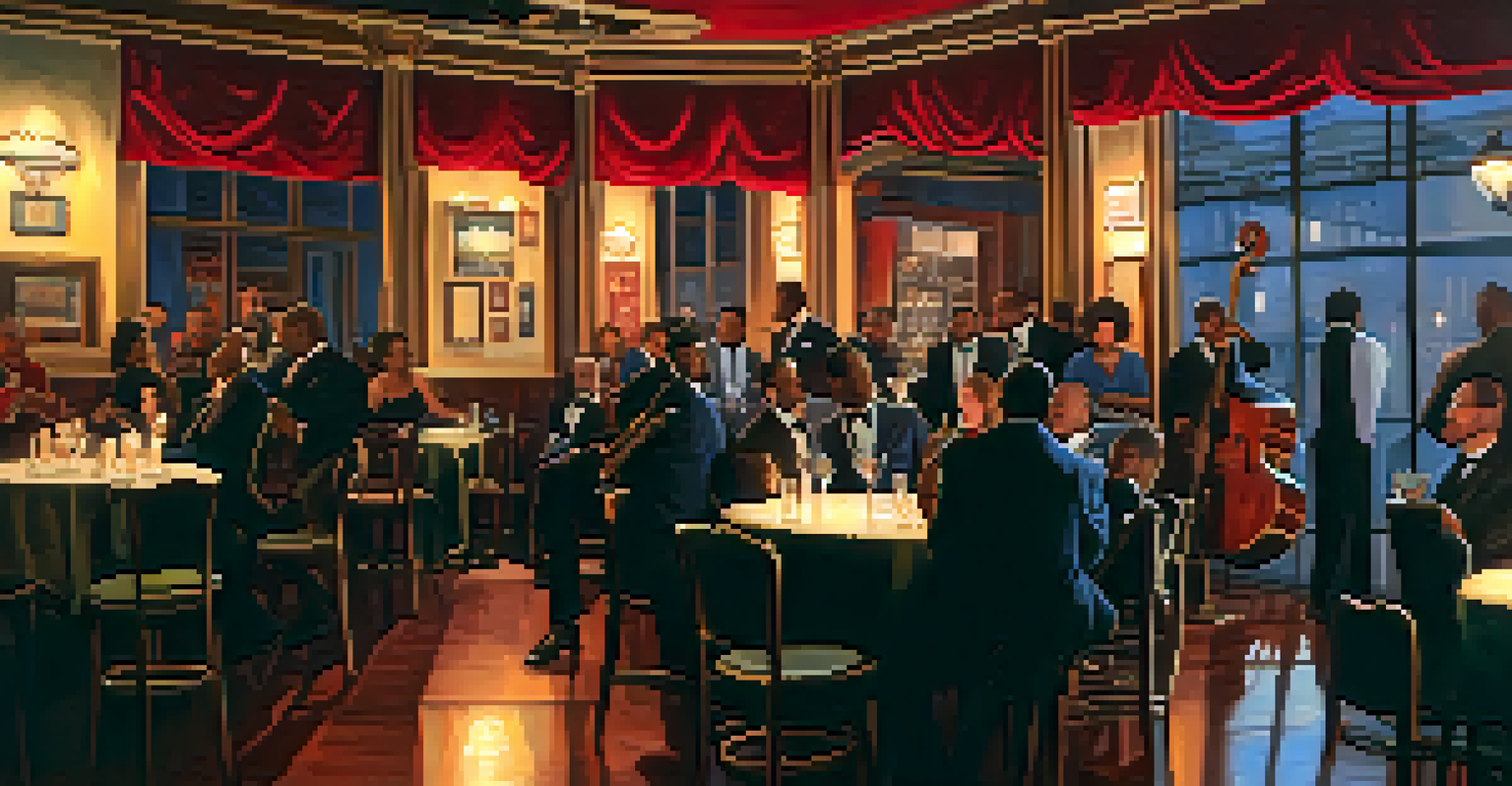Jazz Styles and Innovations: New Orleans' Unique Contributions

The Birth of Jazz: New Orleans as a Musical Melting Pot
New Orleans is often celebrated as the birthplace of jazz, a genre that represents a rich blend of cultural influences. In the early 20th century, a vibrant mix of African, European, and Caribbean musical traditions converged in this city. This unique fusion gave rise to a distinct sound characterized by improvisation, syncopation, and expressive rhythms. It's like a rich gumbo, where each ingredient contributes to a complex and flavorful dish.
Jazz is the only music in which the same note can be played night after night but differently each time.
As African American communities in New Orleans began to assert their cultural identity, they brought with them a range of musical forms, including blues, ragtime, and spirituals. These styles formed the foundation of jazz, creating a sound that was both innovative and deeply rooted in tradition. The streets of New Orleans became alive with brass bands, street performers, and dance halls, all contributing to the city's vibrant musical landscape.
The significance of this cultural melting pot cannot be underestimated; it served as a fertile ground for experimentation and creativity. Musicians began to push the boundaries of existing forms, leading to the evolution of jazz as a genre. This innovative spirit is what continues to define New Orleans as a crucial player in the history of jazz music.
Key Jazz Styles Originating from New Orleans
New Orleans is home to several distinctive jazz styles that emerged in the early 20th century. One of the most prominent is Dixieland jazz, known for its lively tempo and collective improvisation. Imagine a musical conversation where each musician adds their unique voice, creating a harmonious and joyful sound. This style often features brass instruments, clarinet, and piano, reflecting the city's vibrant music scene.

Another important style is Creole jazz, which highlights the contributions of Creole musicians who blended European classical influences with African rhythms. This style often incorporates more complex harmonies and intricate melodies, showcasing the technical prowess of its performers. It’s a beautiful illustration of how diverse cultural backgrounds can come together to create something new and exciting.
Jazz Origins in New Orleans
New Orleans is the birthplace of jazz, marked by a rich blend of African, European, and Caribbean musical influences.
Additionally, the New Orleans jazz scene gave rise to the blues, a genre that has profoundly impacted jazz and popular music. Characterized by its emotional depth and storytelling, the blues resonates with listeners on a personal level. This connection to human experience is what makes the music from New Orleans so relatable and timeless.
Innovations in Jazz Instrumentation from New Orleans
The instrumentation used in New Orleans jazz is one of its defining features, reflecting both innovation and tradition. Early jazz bands typically included brass instruments like trumpets and trombones, along with percussion and woodwinds. This combination created a vibrant and rich sound that captivated audiences. Think of it as a colorful palette where each instrument adds its hue to the overall masterpiece.
The music is the only thing that can bring us together, and I think that's what jazz is all about.
As jazz evolved, musicians began to experiment with different instruments and arrangements. The incorporation of the piano and the banjo added layers of complexity and texture to the music. Notably, the use of the sousaphone, a brass instrument designed for marching, became a staple in New Orleans jazz, showcasing the city's unique style and flair.
These innovations in instrumentation not only set New Orleans apart but also influenced jazz musicians across the globe. The willingness to explore and adapt has been a hallmark of the genre, allowing it to evolve while retaining its roots. This spirit of innovation is what continues to inspire new generations of musicians today.
The Role of Improvisation in New Orleans Jazz
Improvisation is at the heart of jazz music, and New Orleans has long been recognized as a breeding ground for this art form. Musicians in the city are known for their ability to spontaneously create melodies and rhythms, making each performance a unique experience. It’s akin to having a conversation where each participant builds on what the others have said, leading to an organic flow of ideas.
In New Orleans, the tradition of improvisation is deeply rooted in the musical culture, allowing artists to express their individuality and creativity. This element of surprise keeps both performers and audiences engaged, as no two performances are ever the same. The city’s lively atmosphere encourages musicians to take risks, pushing the boundaries of their craft.
Improvisation as Jazz's Core
Improvisation is fundamental to New Orleans jazz, allowing musicians to express their creativity and make each performance unique.
This emphasis on improvisation has not only shaped the sound of New Orleans jazz but has influenced countless other musical genres. From rock to hip-hop, the spirit of improvisation can be heard in various forms of music today. The legacy of New Orleans as a hub for improvisational creativity is a testament to its enduring impact on the world of music.
The Influence of New Orleans Jazz on Modern Music
The impact of New Orleans jazz extends far beyond the city's borders, influencing countless modern music genres. Elements of jazz can be found in rock, pop, and even hip-hop, showcasing its versatility and lasting legacy. For instance, artists like Louis Armstrong and Jelly Roll Morton laid the groundwork for future musicians, blending jazz with popular music trends of their time.
Furthermore, contemporary artists often draw from the improvisational techniques and rhythms established by New Orleans musicians. This fusion of styles has led to the emergence of new genres, such as jazz fusion, which combines jazz with rock and funk. It's a beautiful example of how the spirit of innovation continues to thrive in the music world.
As we listen to modern music, it’s essential to recognize the roots of these sounds in the rich history of jazz. New Orleans' contributions to the genre have shaped not only the music we enjoy today but also the creative processes of artists across various genres. This interconnectedness highlights the importance of understanding and appreciating the origins of the music we love.
Celebrating Jazz Festivals in New Orleans
New Orleans celebrates its jazz heritage through vibrant festivals that bring together musicians and fans from around the world. The New Orleans Jazz & Heritage Festival, for instance, showcases not only jazz but also a variety of genres rooted in the city’s culture. This festival is a lively celebration of music, food, and art, drawing visitors eager to experience the unique spirit of New Orleans.
During these festivals, the streets come alive with performances from both established artists and emerging talents. Attendees get the chance to witness the magic of live jazz, with musicians improvising and collaborating on stage. It's an electrifying atmosphere where the energy of the crowd feeds into the performances, creating unforgettable moments.
Jazz's Lasting Global Influence
New Orleans jazz has profoundly impacted modern music genres, shaping styles like rock, pop, and hip-hop through its innovative spirit.
These festivals serve as a reminder of the city's rich musical heritage and the importance of community in the world of jazz. They highlight how music can bring people together, fostering a sense of connection and celebration. For many, attending a jazz festival in New Orleans is a rite of passage, a way to immerse oneself in the city's vibrant culture and history.
Preserving New Orleans' Jazz Heritage for Future Generations
As we explore the rich history of jazz in New Orleans, it’s essential to consider the importance of preservation. Organizations and local musicians are dedicated to keeping the jazz tradition alive, ensuring that future generations can experience its beauty. This commitment to preservation is akin to nurturing a delicate plant, where care and attention allow it to flourish.
Educational programs and workshops are being implemented in schools and community centers, introducing young people to the basics of jazz music. By providing access to instruments and mentorship from experienced musicians, these initiatives help cultivate a new generation of jazz enthusiasts. It’s heartening to see the passion for jazz continue through the youth, ensuring its legacy endures.

Additionally, the preservation of historical venues and the documentation of jazz history play a crucial role in maintaining this cultural treasure. As we celebrate the innovations and styles that originated in New Orleans, we must also commit to protecting this heritage. The future of jazz depends on our collective efforts to honor and sustain its roots.